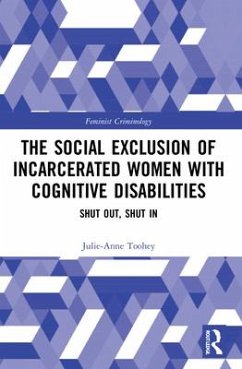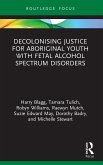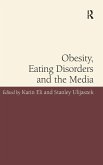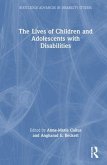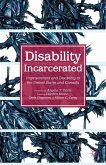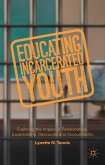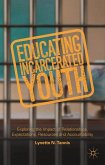The Social Exclusion of Incarcerated Women with Cognitive Disabilities explores the lived experience of cognitively disabled women incarcerated in Australia. It draws upon in-depth interviews with Indigenous and non-Indigenous women, as well as interviews conducted with prison practitioners - psychologists, counsellors, and Aboriginal Liaison Officers. Using a theoretical framework of social exclusion, the book charts the complex intersection between cognitively disabled women and the Criminal Justice System, and how this connection works to foster and maintain a state of social exclusion prior to incarceration, and equally, within the prison setting. The book also provides a practical template for other researchers to use when investigating the aligned fields of the Criminal Justice System and incarceration, women offenders, cognitive disability, and social exclusion. By placing the voices of the incarcerated women with cognitive disabilities 'front and centre', a new and innovative approach to social exclusion emerges. The book moves beyond the 'telling of sad stories' to examine the social and political climate that permits disadvantage, inequality, and injustice to flourish. This book will be of great interest to academics and students in criminology, criminal justice, disability studies, women's and gender studies, and penology. In exploring theory in a practical way, it will also be of use to those involved in the health sector, community services, disability support agencies, disability advocates, prisoner advocacy, women's studies and women's advocacy, and human rights activism.
Hinweis: Dieser Artikel kann nur an eine deutsche Lieferadresse ausgeliefert werden.
Hinweis: Dieser Artikel kann nur an eine deutsche Lieferadresse ausgeliefert werden.
This fascinating book provides vital insights into the terrible and exclusionary world of the criminal justice-cognitive disability nexus, and the people at its centre. Providing a platform for hiterto voiceless women, Julie-Anne Toohey challenges us to radically change or abolish institutions that mostly serve to deepen the pain, suffering and abuse of the vulnerable. Prison research of this nature is rare. Yet, amongst the sadness and despair is resilience and hope, and this, too, is a crucial message of this powerful book.
Rob White
Distinguished Professor of Criminology, University of Tasmania, Australia
Rob White
Distinguished Professor of Criminology, University of Tasmania, Australia

